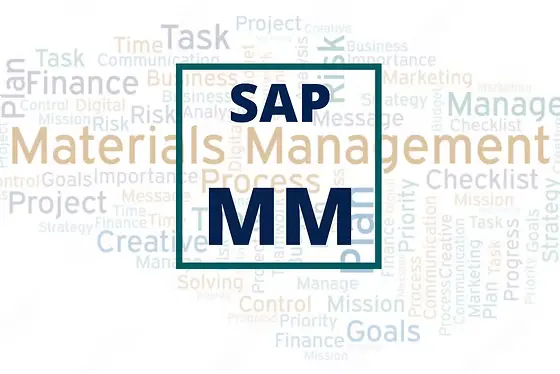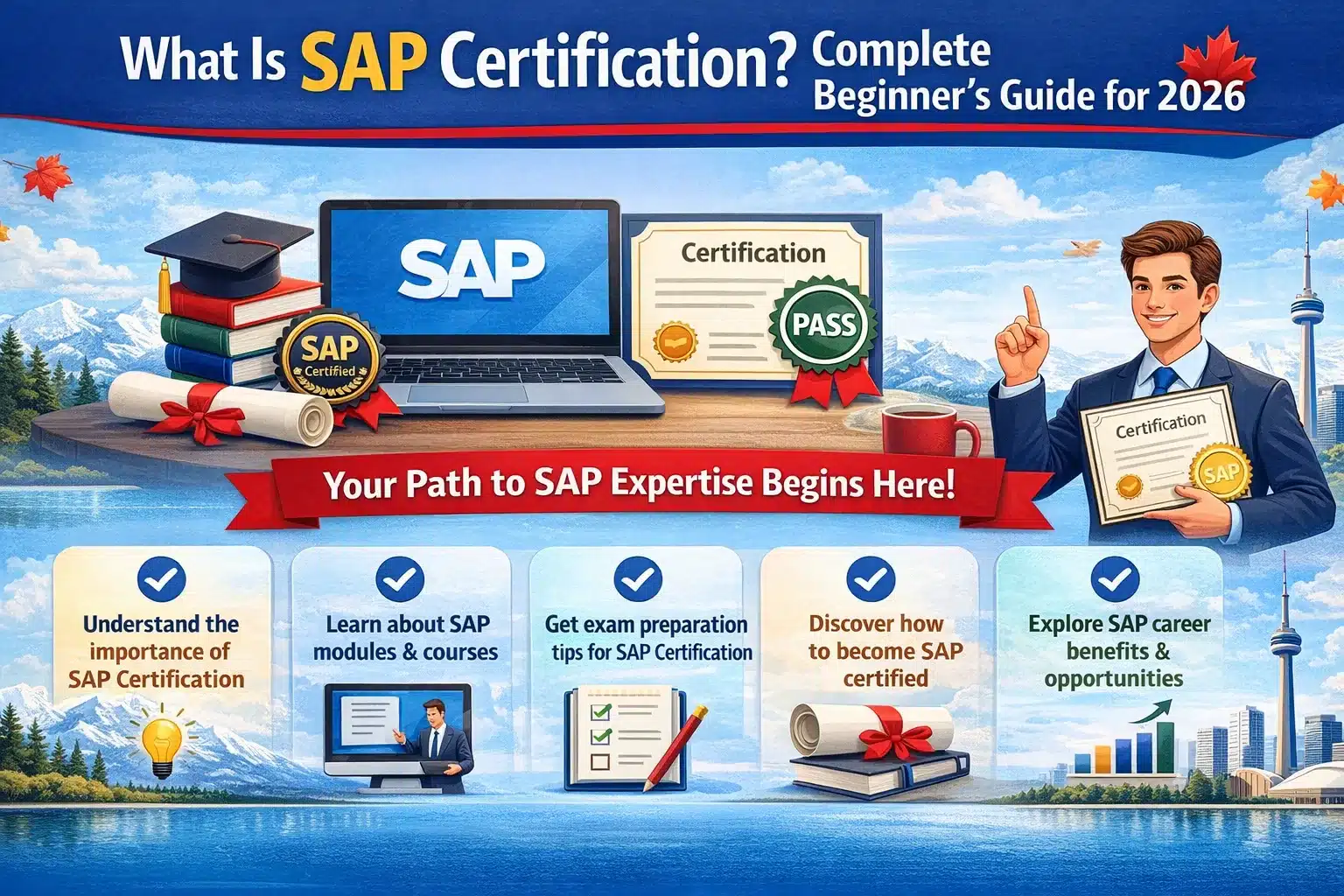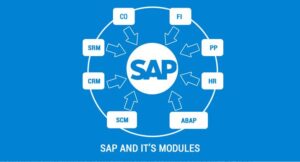SAP MM Modules: Key Functions Every Beginner Should Know
What is SAP MM?
Table of Contents
ToggleThe SAP MM (Materials Management) Online Training and Certification Course is a specialist curriculum that features a complete overview of the SAP MM module, which is an important part of the SAP ECC (ERP Central Component).
The purpose of SAP MM is to manage an organization’s materials and the organization’s material resources. This includes control of material value, control of inventories, and procurement of materials.
The online course covers all aspects of SAP MM, including BOOM data, maintaining purchasing and inventory, verification of invoices, etc. The course will also cover the settings required to customize SAP MM for an organization. After completing the course, Participants can choose to complete additional SAP MM training, thus demonstrating their mastery of this subject. In this blog, we provide you with the major functions of SAP MM modules for every beginner.

Features of SAP MM
Material Management (SAP MM) is a critical part of SAP ECC because it provides support for the complete supply chain process. It also covers all aspects of buying things to paying for them. It allows a group to have a single source for managing all of its material-related activities. The important features of SAP MM include:
- The ability to connect with other SAP modules, such as Finance (FI), Controlling (CO), Sales and Distribution (SD), Quality Management (QM), and Plant Maintenance (PM), to ensures a seamless flow of information for business processes.
- A comprehensive Vendor Master Data management solution that provides a single source of truth for managing and obtaining information about vendors.
- Purchase Order Management and Purchase Requisition Management support processes that allow groups to acquire goods and services more effectively.
- Inventory management features that allow you to keep track of and manage stock movements (goods receipt, goods issue, and stock transfers).
- Material Requirement Planning (MRP) functionality that assists groups with forecasting and planning for their future material requirements.
- The implementation of automated steps and processes for accounting items and inventory valuations ensures that resources are valued accordingly and that the general ledger is updated accurately.
All of these features make SAP MM a complete and reliable tool for handling goods and materials, which generates higher profits and efficiency.
Components of SAP MM
SAP MM (Materials Management) contains many components, each dealing with a portion of materials management. Here is a summary of your components:
- MM – CBP (Consumption-Based Planning): This component involves planning based on previous consumption patterns of items. The component helps to identify what items are needed, how much is needed, as well as when they will be consumed.
- MM – PUR (Purchasing): This component is critical and processes all purchasing activities such as purchase requisitions, purchase orders, goods receipts, and invoice verification.
- MM – SRV (External Services Management): This component is responsible for processing external services. This may include processing service contracts, service entries, and service provider invoicing.
- MM-IV (Inventory Management): Inventory Management is responsible for managing stocks in terms of both quantity and value, as well as the planning, entry and documentation of all goods movement for the plant’s storage facility.
- MM- IV (Logistics Invoice Verification): Logistics Invoice Verification is not the same as Inventory Management since it only takes place after the goods are received.
These parts are very important to the SAP MM module, and if they work together, then they make a complete system of handling an organization’s inventory and material needs.
Benefits of SAP MM
SAP MM provides various benefits to the organization by delivering a streamlined and integrated approach to controlling material procurement, inventory, and any related processes. SAP MM authorizes businesses to optimize their supply chain operation with comprehensive functionalities and seamless integration with other SAP modules. Mentioned below, we provide you with the benefits of SAP MM:
- Enhanced procurement efficiency and cost savings
- Improves visibility and inventory control
- Streamlines vendor management and collaboration
- Timely reporting financial system
- Better forecasting and effective demand planning
- Improved traceability and compliance
- Better decision-making through real-time insights
What You’ll Learn in SAP MM Online Training for Beginners?
A good SAP MM beginner learning course will cover all of the theoretical aspects and practical exercises. Here is an outline of the areas typically addressed:
A Brief Investigation of ERP and SAP
- How ERP and SAP systems operate
- Navigating through the SAP GUI
- SAP MM’s position in the business organization methodologies
Organizational Structure
- Business code, plants and garage locations
- Companies and groups for purchasing
Master Data Management
- Acquire the material
- Acquire the vendor
- Purchasing information
How to Purchase Something: Purchase Requisition
- Requesting a quote (RFQ)
- The Purchase Order
- Verifying the Good Receipts and Invoices
Inventory Management
- Comparison of stocks and brands
- Inventories of goods, shift listings and problems
- Movements of stock and physical inventories
Valuation and Account Deciding
- Material’s valuation and cost
- Automated writing to the account
Reports and data obtaining
- MM-specific evaluations and analytics systems
Systems for MM review and data integration to other modules
- MM and FI (to pay the bills)
- MM and SD to make orders.
- WM and MM (warehouse)
Conclusion
SAP MM is an important tool for businesses that need to manage procurement, inventory, and vendor relations efficiently. Through a SAP MM course, beginners can quickly learn the functions of this powerful module and apply them in real-world business scenarios. SAP MM provides the tools which is necessary to streamline operations like handling materials, managing suppliers, or optimizing inventory.
By selecting a SAP course at Nextnow, you are setting yourself up for success, equipping the skills to navigate the world of SAP MM and take various challenging roles in supply chain management and procurement.
FAQs
What are the basic functions of SAP MM?
Mentioned below, we provide you with the basic functions of SAP MM:
- Procurement Management
- Inventory Management
- Material Valuation and Costing
- Vendor Evaluation
- Logistics and Warehouse Management
- Contract Management
- Reporting and Analytics
Is SAP MM easy to learn?
SAP MM is considered one of the easiest SAP modules to learn, especially for those who don’t have any IT experience.
Is SAP MM still in demand?
SAP MM is still in demand for those industries like manufacturing, retail, and logistics.
Dont Hesitate To Contact Us
Recent Post









